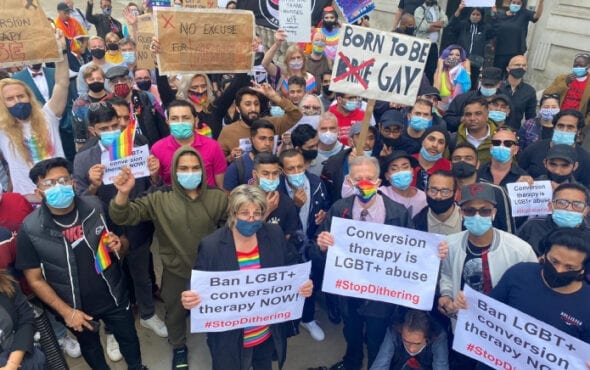
Activists are questioning whether or not the UK’s Equality and Human Rights Commission (EHRC) is “truly fit for purpose” after it suggested a “differentiated approach” to a trans conversion therapy ban.
In a report published on 26 January in response to the UK government’s plans to legislate a conversion therapy ban, the human rights watchdog said the consultation does not “address the possible need to consider a differentiated approach in relation to sexual orientation and being transgender so as to ensure, in particular, that clinicians and therapists are not prohibited from providing appropriate care and support for individuals with gender dysphoria.”
The EHRC, which aims to promote and uphold equality laws in the UK and is funded by the UK government’s Equalities Office, also criticised what it called the “lack of evidence about conversion therapy in relation to being transgender,” and concluded that “these matters require further careful and detailed consideration before legislative proposals are finalised and the implications of them can be fully understood.”
We have also published our response to the UK Government’s consultation on conversion therapy.
Download and read our response here ⬇️ https://t.co/1djOSIrOfN
— EHRC (@EHRC) January 26, 2022
Conversion therapy is most commonly described as “practices, behaviours, or words aiming to modify or repress” a person’s “sexual orientation or identity.”
It has been widely condemned by health experts, with some comparing it to torture.
Among these are the World Health Organisation, World Psychiatric Association and the United Nations.
Despite promising to ban the practice in the UK since 2018, the government is yet to do so.
Its current consultation on the matter runs until 4 February 2022, after which a partial ban is expected to be implemented that will allow those over the age of 18 to consent to it.
However, the EHRC’s lengthy report suggested delaying a ban on trans conversion therapy until more information is available.
“Legislation to ban conversion therapy attempting to change a person to or from being transgender should follow, once more detailed and evidence-based proposals are available which can be properly scrutinised,” it stated.
The #BanConversionTherapy Coalition statement on the @EHRC response to the Government consultation.
Attached and thread.@GEOgovuk @MinFreerHMG @ECTScotland @BanConversionNI https://t.co/Ggu8m4i0Ij pic.twitter.com/B5X9Hdjd5Q
— BanConversionTherapy (@BanCTorg) January 27, 2022
Jayne Ozanne, Chair of the Ban Conversion Therapy Coalition, told GAY TIMES that she was “perplexed” by the response of the EHRC given what research on conversion therapy shows.
“The government’s own research – along now with significant international research and hundreds of survivor testimonies – has shown that the most common form of ‘conversion therap’ is to be found in religious settings and those who are most at risk of ‘conversion therapy’ are trans and non-binary people,” she continued.
“However, the EHRC is recommending that protections for trans and non-binary people should be delayed and that various religious practices, which we know are harmful, should continue!
“This is deeply shocking coming from the one body whose legal duty it is is to protect the rights of the vulnerable and to champion those who are being harmed by prejudice and discrimination. This is a significant change in its position and one has to now ask whether the EHRC is truly fit for purpose?”
Lui Asquith, Director of Legal and Policy at trans charity Mermaids, explained to GAY TIMES that the EHRC’s report is “extremely concerning”.
They added: “We know – and Government data illustrates – that trans people are also victims to this form of abuse and we must leave no-one behind.
“This is beyond outdated and we are lagging behind several other countries and states such as France and Canada and Victoria State in Australia who have moved ahead with rigour to pass an outright ban on conversion practices. There is no excuse for anymore heel-dragging.”
The EHRC has failed the trans community with a shameful act of exclusion.https://t.co/mxJY4bLDgk
— Mermaids (@Mermaids_Gender) January 27, 2022
Stonewall also criticised the EHRC in a statement which read: “We are deeply troubled by the approach that the EHRC is taking to trans people’s human rights. Their approach appears to focus on pleasing a noisy minority of anti-trans activists, rather than promoting human rights for all LGBTQ+ people.
“The EHRC has a statutory duty to enforce the Equality Act 2010 and protect equality and human rights across all nine protected characteristics, including sexual orientation and gender reassignment. These statements do the opposite, by actively standing in the way of improving the rights of trans people.”
The UK government’s consultation on banning conversion therapy is open until 4 February 2022 and can be filled out by clicking here.
Today’s statements from the Equality and Human Rights Commission (@EHRC) are an attack on trans equality and undermine their core purpose of regulating, promoting and upholding human rights.
(1/6)— Stonewall (@stonewalluk) January 26, 2022



